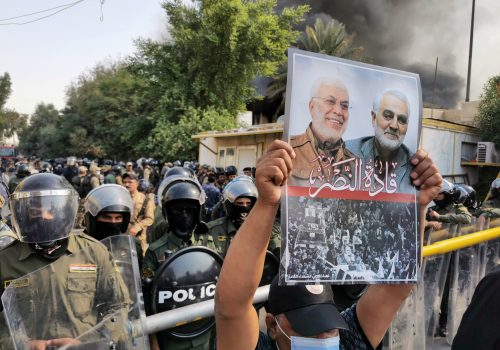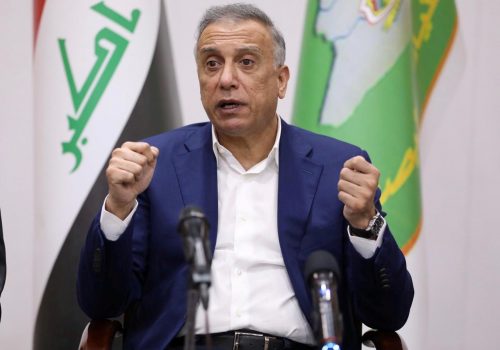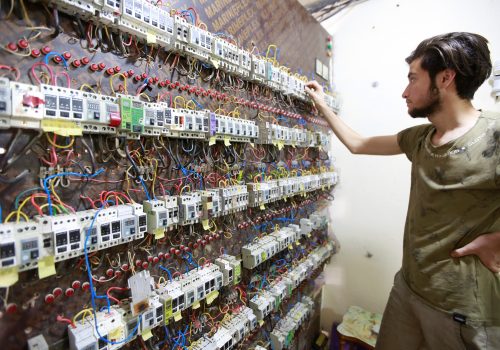How the agri-food sector can turn Iraq’s economy around
Iraq’s economy has imploded. As the Organization of Petroleum Exporting Countries’ (OPEC) second largest producer and the world’s sixth largest oil producer, Iraq is facing major liquidity challenges that have resulted in delays in government employee and retiree salaries and an almost complete halt in government public investment. On top of this, COVID-19 has dealt a decisive blow to Iraq’s economy. The result is a perfect storm, caused by decades of security and political challenges coupled with imbalanced and unsustainable policy decisions.
Amidst Iraq’s economic meltdown, agri-food can play a pivotal role in turning the economy around and putting it back on a sustainable growth track. While economic (fiscal) reforms, government restructuring, and infrastructure investments can help stimulate the economy, agri-food is a low hanging fruit: it can attract much-needed private sector investment at a time of government cash crunch and create jobs quickly, as the country struggles with youth dissatisfaction, a high unemployment rate, almost daily protests, and the return of insurgency.
Oil and agriculture: A confounding relationship
The Iraqi economy is overly dependent on oil, which accounted for over 96 percent of Iraq’s exports, 92 percent of government budget revenues, and 43 percent of gross domestic product (GDP) in 2019. From an all-time high of 4.8 million barrels per day (bpd) in August 2019, Iraq has had to reduce its oil production by around 3.5 million bpd under the OPEC+ deal to cut global output due to lower global demand as a result of the coronavirus pandemic. At the same time, Iraq had to contend with already depressed global oil prices. Iraq’s premium Basrah Light sold for a high of $74.8 per barrel on January 8, only to drop to $23.8 per barrel in May, before recovering to a range of $40 to $48. With oil revenues declining by around 50 percent, the 2020 projected real GDP is predicted to shrink by around 12.1 percent in 2020.
COVID-19 and the unsurpassed economic stress driven by the oil price crash have exposed Iraq’s fiscal fragility while forcing a rethink of Iraq’s overall economic structure under the government’s new economic plan. This should naturally lead to a consideration of the ample opportunities in the agri-food sector. Long before Iraq became one of the major oil-exporting countries, it was an agriculture-based economy. Even today, the agri-food sector is still the largest contributor to Iraq’s GDP after oil revenues. While agriculture’s value added as a percentage of GDP has dropped from heights of 20 percent pre-2003 to 3.3 percent in 2019—partly due to the increase in oil prices during this period—agriculture’s absolute value added increased from $2.5 billion in 2003 and 2004 to $11.5 billion in 2014. This rise was cut short by the Islamic State of Iraq and al-Sham (ISIS), bringing the value down to around $4.6 Billion in 2019. Despite this, it is fair to say that agriculture is the hidden success story of the last two decades.
The agri-food sector’s robustness has been almost independent of the country’s addiction to oil. Following the 2003 US invasion, the Iraqi agri-food sector has not suffered from the resource curse or Dutch disease per se, showing impressive growth until the disruption caused by ISIS in 2014. The increase in the development of the oil industry has not shifted government resources from the agri-food sector. The Public Distribution System (PDS), the country’s food basket subsidy, which secures purchase of food production from local markets and distributes it to most Iraqis at highly subsidized prices, has only subsided from the period under Saddam Hussein due to fiscal pressures in recent years and plunging oil prices since 2014. Still, successive governments have strived to maintain and preserve the PDS, partly from a misconstrued belief in food self-sufficiency policies and partly due to Iraq’s complex political-economic realities; most political parties vie to use the agricultural sector as support for their political aspirations, their vested financial interests, and their respective political bases.
Notably, the increase in oil revenues has not resulted in another hallmark of the Dutch disease: the Iraqi dinar, which is fixed to the US dollar, overvaluing. With the currency fixed, Iraq’s account balance surplus has created an increase in foreign currency reserves. While this surplus has expanded Iraqi purchasing power, the government has prioritized cheaper imports over protecting local agricultural production. In fact, successive ministers of Agriculture and Trade have tried to impose tariffs and protections on local agricultural production. Nevertheless, this surplus, together with the currency devaluation in neighboring countries—intentional and unintentional due to sanctions on the likes of Iran and Turkey—has facilitated a key opportunity for these nations to exchange their exported agricultural production for US dollars. This harms the agriculture sector in Iraq due to uncontrolled competition from Iran’s dumping and the higher quality products coming from Turkey.
Thus, the oil industry itself has not had a direct or indirect impact on the agri-food sector. Rather, oil has served as a means to subsidize and maintain agri-food’s status quo during waves of political instability and conflict. What has undermined the further growth of the agri-food sector vis-a-vis the oil sector is a shortsighted policy of focusing only on oil and associated petroleum products while overlooking the potential for Iraq to become a global player in other strategic commodities, such as wheat, barley, dates, and high-value crops.
Thinking beyond oil: The case for agri-food
The current fiscal crunch, lower oil prices, and COVID-19 should force Iraq to refocus on agri-food. In this regard, the government is refocusing its wide array of subsidies to areas within the agri-food value chain to where it is most needed. For example, the joint World Bank, World Food Programme, Food and Agriculture Organization, and International Fund for Agricultural Development COVID-19 Food Security Monitor has reported that Iraq’s PDS has already been cut down to less than four items, with distributions delayed.
Unfortunately, the program is fraught with corruption and logistical complexities, but there is progress. It was recently announced that the program would have parts of its vast $1.43 billion budget under the Trade Ministry transferred to target seed subsidies under the Agriculture Ministry. This move is a sign of the evolution of the current subsidy system, as it is redirecting to where it is most needed, albeit under the pressure of the current fiscal crisis. Over the long term, this will help turn Iraq’s state support into a more efficient and targeted scheme, reduce government involvement and dependence on government support and the state budget, and open up the agri-food sector for market-based competition.
But beyond gains and efficiencies resulting from policy and institutional reforms, the agri-food sector has tremendous potential to solve two of Iraq’s pressing problems: job creation and private sector engagement, two tasks beyond the capabilities of the government. Agri-food is a sector that can provide fast job creation in a very short period, especially for youth and women. In the World Bank’s most recent Country Economic Memorandum—the bank’s economic reform paper for Iraq—published in August, it estimates that the agri-food sector can create 23,382 small enterprises in a high-growth environment, adding more than 120,000 new jobs by 2030. By focusing on poultry, tomato—a high value crop—and date value chains, in addition to the existing prioritization of the wheat and barley value chains, the World Bank’s study concludes that Iraq can achieve competitive advantage if it employs a mix of policy and institutional reforms. This includes infrastructure investments in aggregations along the value chain and harnessing the power of digitization.
Agri-food is also a segment of the economy that the private sector has been historically willing to invest in, making it possible to even survive without significant government support. The oil price shock of 2014 that came with the ISIS incursion into Iraq’s main food basket governorates serves as a good case of the sector’s resiliency and its attractiveness to the private sector. Between 2014 and 2017, Iraq’s agricultural output fell from about $15 billion to about $7.6 billion, representing an almost 50 percent decline due to the security challenges. Total investment in agriculture decreased during the ISIS incursion and the oil price shock of 2014, driven by a decline in public investment, which dropped from $349 million in 2014 to $93 million in 2015. Nevertheless, the World Bank has found that, while private sector investment in agriculture fell from $104 million to $86 million in the same period, it has picked up since 2016, increasing from $112 million in 2016 to $503 million in 2017. Meanwhile, public sector investment has still not recovered.
Even if oil rebounds beyond $50 per barrel, Iraq has an incentive to reform decades of structural economic challenges and unsustainable policies. The Iraqi government’s White Paper, a reform proposal presented recently to parliament, is a step in the right direction, though it still needs a concrete action plan. By providing the grounds for agri-food to grow through needed policy reforms and institutional reorganization, the government can help grow agriculture back to its previous potential. Beyond the short-term gains of job creation and private sector involvement, the World Bank projects that agricultural GDP can grow up to $30 billon over the next twenty years. This would make agriculture a main pillar of the Iraqi economy, in addition to its critical role in post-conflict stabilization and social cohesion in Iraq’s rural areas.
Hadi Fathallah is a director at NAMEA Group. He is also a consultant at the World Bank and the International Fund for Agricultural Development (IFAD) in Iraq. The views expressed in this article do not necessarily represent those of the institutions he works for or is affiliated with. Follow him @Hadi_FAO.
Timothy Robertson is a senior agricultural specialist with Global Agriculture Practice at the World Bank Group.
Image: Farmers carry palm trees belonging to Kuwaiti investor Abdul-Aziz al-Babtain, to be planted in a desert in Basra, Iraq October 24, 2020. Picture taken October 24, 2020. REUTERS/Mohammed Aty


